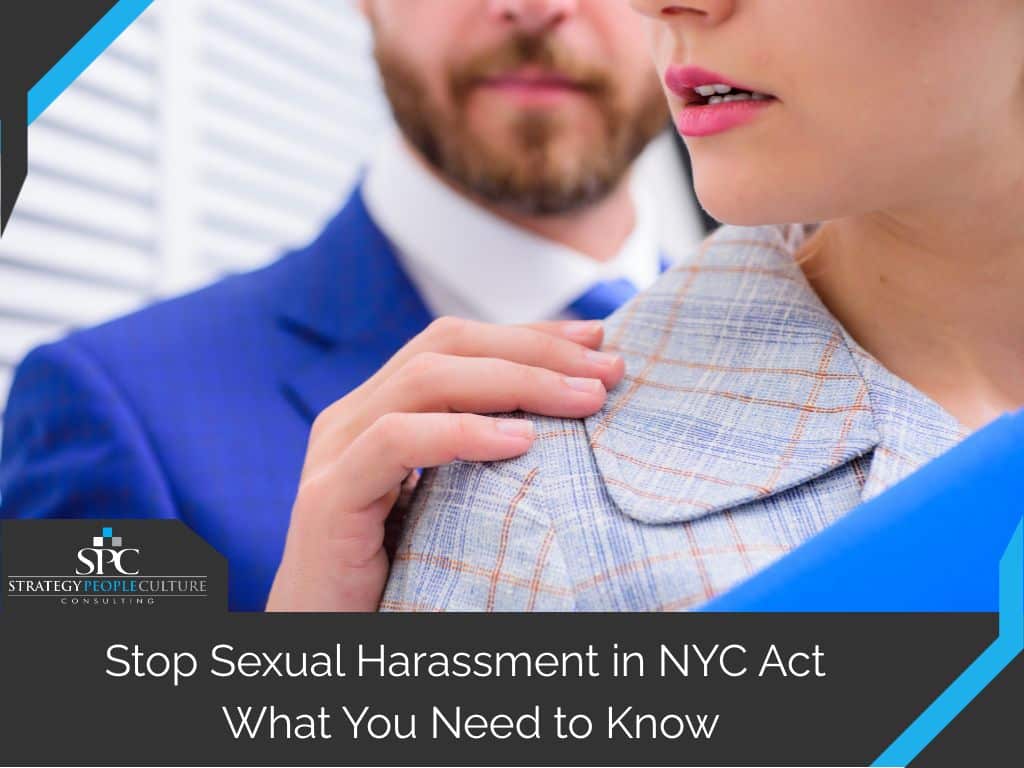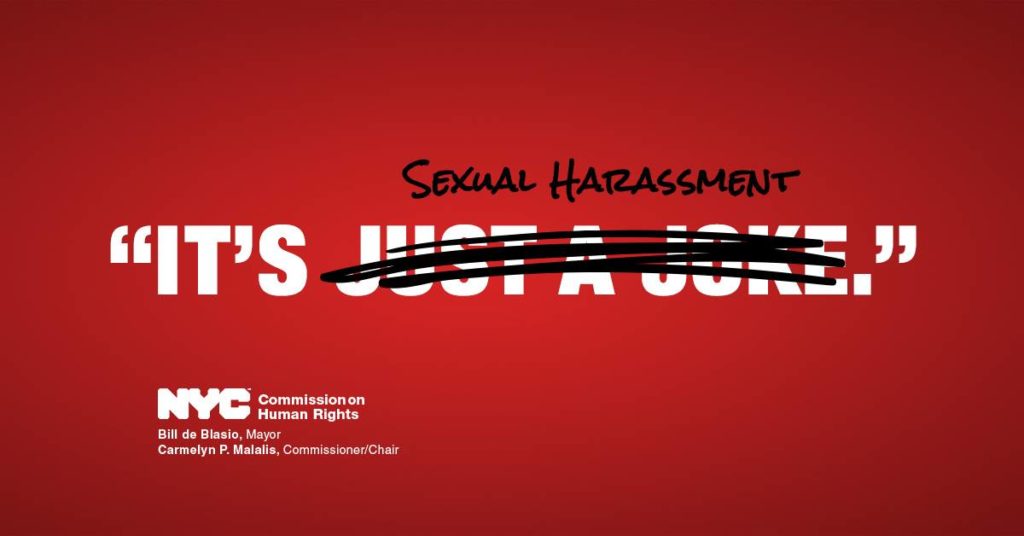Stop Sexual Harassment in NYC Act: What You Need to Know

When it comes to new workplace sexual harassment laws, New York State and New York City have been at the forefront of what has become a trend for the rest of the country. It seems both the State and the City have been making a strong effort to crack down on discrimination and harassment under their human rights laws – and succeeding.
Effective as of 2019, New York City instituted the “Stop Sexual Harassment in NYC Act” while New York State passed similar laws that carry across the entire State of New York. The act was a serious response to the many allegations against harassment by politicians, business executives, and celebrities in the area.
Ironically, New York’s governor Andrew Cuomo has just resigned over sexual and workplace harassment allegations, harkening to a coming age where such behavior is illegal and not tolerated by the public.
The Stop Sexual Harassment in NYC Act works in tandem with the NY State Budget Act of 2018 and requires mandatory sexual harassment training in New York for all contractors and regular employees. While the Stop Sexual Harassment Act requires employers with more than 15 employees combined, the laws require ALL employers, regardless of their size in New York, to provide this training.
To help you avoid hefty fines and comply with NYC’s latest regulation, we’re diving into this act and explaining how it might affect you, your team, and your company. Keep reading to learn more.
What is the Stop Sexual Harassment in NYC Act?

Source: nyc. Gov
The Stop Sexual Harassment in NYC Act is a relatively new law (2018, effective 2019) that requires employers to:
- Conduct annual anti-sexual harassment training for all employees (including managers and supervisors, independent contractors, and in many cases, part-time and temporary workers).
- Provide anti-sexual harassment training for all new hires within 90 days of employment.
- Conspicuously display anti-sexual harassment rights and responsibilities in the workplace.
- Provide complaint procedures to their employees, including information on filing a complaint with the NYC Commission on Human Rights.
- Distribute anti-harassment policies to all new employees.
Furthermore, the act prohibits nondisclosure clauses in settlements/agreements related to sexual harassment complaints – unless the complainant is the one requesting confidentiality in regards to the situation.
The act aims to address the need for sexual harassment compliance training in businesses throughout the NYC area (and consequently, the entire State through similar laws). Keep in mind it applies to anyone associated with contracts, contract work, businesses, or organizations in New York City.
What the Act Counts as Sexual Harassment

Generally, the Stop Sexual Harassment in NYC Act was enacted to spread awareness of and end two kinds of sexual harassment in the workplace. This includes:
1. Quid Pro Quo
You’re likely familiar with this phrase, which is Latin for “something for something.” Quid pro quo sexual harassment occurs when someone with authority in a workplace makes decisions about an employee or treats them differently based on their willingness to grant or deny sexual favors.
Under the 2018 NYC act, all employees must be made aware of the fact that employers do not tolerate or permit the request of sexual favors.
Additionally, employees must have the resources needed to know how to file a claim if they are victims of quid pro quo sexual requests by a co-worker, boss, manager, etc.
2. Hostile Work Environments

The second kind of sexual harassment targeted by the Stop Sexual Harassment in NYC Act is hostile work environments.
If a supervisor’s, manager’s, or co-worker’s sexual harassment results in a workplace that is intimidating, offensive, or hostile to other employees, it is considered to fall under the company’s responsibility.
Under the latest NYC laws, the employer will be held responsible for sexual harassment unless it can prove:
- It has reasonably tried to prevent and correct the harassing behavior (in a timely manner)
OR
- The employee unreasonably failed to take advantage of preventive/corrective opportunities provided by the employer.
The Stop Sexual Harassment in NYC Act exists to put an end to harassment and discrimination in the workplace. A big part of that is ensuring companies provide the right information, materials, and training to employees to contribute to a safe, healthy workplace environment.
The Role of Employers – Mandatory Anti-Harassment Training

Let’s talk about the mandatory anti-sexual harassment training required by the city’s latest act. As an employer responsible for, what are you responsible for implementing and overseeing the training within your company?
As we mentioned earlier, the combined NY laws mandate that all employers are required to provide the training, including interns or part-time employees. Therefore, from the highest manager to the newest entry-level employee, everyone will need to participate in training at least once a year and within 90 days of being hired.
According to the act’s requirements, the training curriculum must cover:
- Sexual harassment Explanation and examples
- Bystander intervention education
- Prohibition against retaliation
- The process of filing a sexual harassment complaint
- And more
Additionally, employers are required to maintain records of all employee training for up to three years. This includes employee acknowledgments stating they have received the company policy and adequate training.
The training does not need to be conducted in person. In fact, most NYC businesses opt for online harassment training that can be shared with employees everywhere. The most important thing is the training covers all of the material required by the NYC law and is interactive.
Strategy People Culture’s Anti-Harassment Training Programs
If you’re looking for anti-sexual harassment training that meets government standards, we can help you out.
Strategy People Culture provides programs that meet both federal and state requirements by:
- Providing real examples and hypothetical situations
- Assessing your company’s current harassment policies
- Training all levels of employees
- Implementing strategies for handling future harassment cases
- And much more
We understand there are both cultural and legal reasons to obtain professional training for your employees. Let us know what you need, and we’ll reveal how our in-person and virtual EEO training services can meet your requirements.
Ending Workplace Harassment – Together
Fighting workplace sexual harassment will require a combination of employee education and employer effort. Laws like the Stop Sexual Harassment in NYC Act are designed to make workplaces friendlier and safer for all while also protecting the rights of those accused.
As recent social movements have made sexual harassment a pressing topic, especially in corporate America, we can expect to see many governments and businesses re-emphasize the importance of sexual harassment training.
We consistently see business policies evolving – and we expect to see that continue well past the end of 2021. Black Lives Matter, #MeToo, and other movements are ensuring these issues are receiving attention, and employers will need to keep up with the latest expectations and regulations.
If you’re an employer in NYC or anywhere in the United States, now is the time to consider necessary training and documentation. Otherwise, you could face hefty lawsuits and penalties in future sexual harassment cases. For example, the Stop Sexual Harassment in NYC Act imposes fines up to $250,000.
Have Questions? Need Training? Reach Out.
Do you have questions or concerns about your company’s compliance with sexual harassment or discrimination? Send a message to Strategy People Culture today. We’ll help you understand your responsibilities and options under the latest legislation.
For more information on our anti-sexual harassment training, leadership coaching, or other services, call (973) 551-0419. You can also send us an email at info@strategypeopleculture.com.
Our mission is to foster better awareness and safer workplaces for all – and our training programs will help you do just that.
